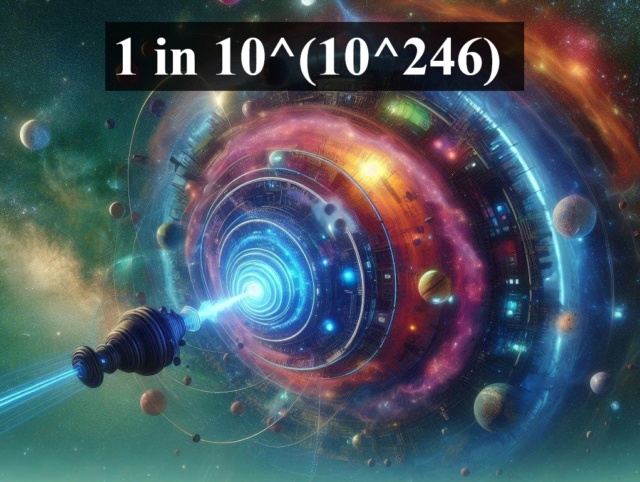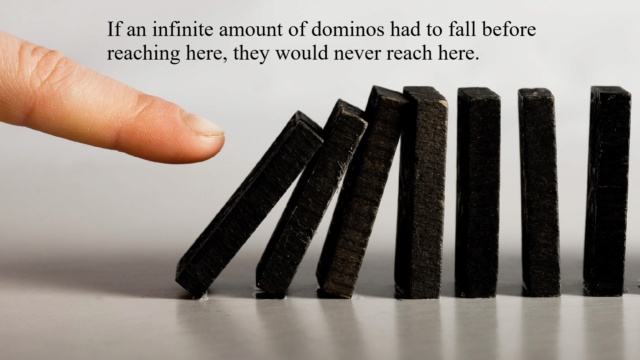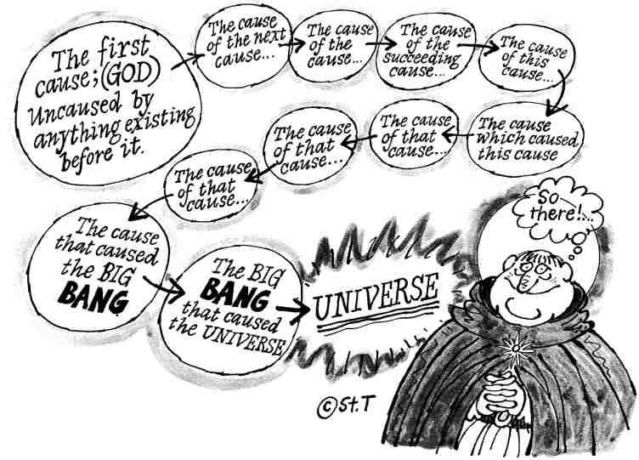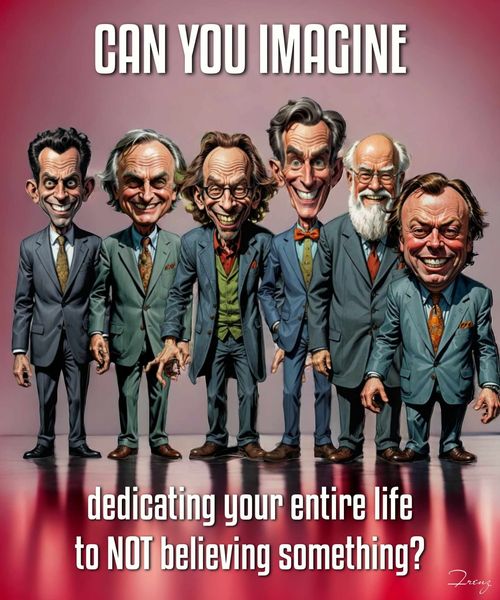The Inescapable Inference to an Infinitely Potent Creator: Unraveling the Profound Fine-Tuning at Every ScaleThe existence of our finely-tuned universe and its origins point toward the necessity of an intelligent, transcendent Creator. The idea that "nothing" caused the universe to spring into existence is rationally and logically incoherent. How could sheer nothingness, devoid of any properties or causal efficacy, generate the reality we inhabit - a cosmos of staggering complexity, governed by precise, mathematical laws and physical constants that make life possible?
Atheists often dismiss the need for a Creator by claiming there is no empirical "evidence" for one. However, this demand for direct sensory detection of the supernatural reveals a profound philosophical naivety. The very nature of a transcendent, nonphysical, eternal Being would by definition lie beyond the capacity of our finite senses to directly apprehend. To require scientific empiricism as the sole arbiter of truth is to unjustifiably delimit reality to only that which is material and temporal.
Moreover, the idea of an eternally existing universe is rendered obsolete by the scientific reality of the Big Bang - a phenomenon that clearly indicates the universe, and even physical reality itself, had an initial boundary or singularity from which it sprang forth. The second law of thermodynamics, which describes the entropic dissipation of useful energy over time, further negates the possibility of an infinite universe. As Dr. Bruce Reichenbach articulates, "No matter what conditions are given for time=0, to actually arrive at the present cosmological circumstances after an infinitely long sequence of events involves a step through infinitely many events, one by one. This is metaphysically impossible."
When we dispassionately consider the alternatives, the existence of an intelligent, transcendent Creator emerges as the most coherent and rational explanation for the origin of our universe. The finely-tuned parameters that make life possible - the precise values of the fundamental constants, the laws that govern physics and chemistry, the delicate balance of conditions in our solar system and planet - defy rationality if attributed to sheer chance or randomness.
The example of the Pythagorean number illustrates this point. If any transcendental number could have originated the universe, the probability of randomly selecting a life-permitting number like the Pythagorean constant out of the infinite set of transcendental numbers is exactly zero. As astrophysicist Dr. Hugh Ross notes, "To get life in the universe, this number must be selected out of the infinite set to a precision of at least one part in a billion billion."
Furthermore, the existence of consciousness, subjective experience, semantic information, and abstract reasoning capabilities within humans provides compelling evidence of a reality that transcends the purely material and points to a mind behind the origin of the cosmos.
Ultimately, while atheists may claim there is "no evidence" for a Creator, such a stance stems from an impoverished reductionist philosophy that a priori excludes entire domains of existence. When we consider the astonishing fine-tuning and specified complexity inherent in the fabric of reality, coupled with our own existence as subjective, rational, conscious beings, the inference to an intelligent, eternal Creator becomes profoundly compelling - arguably incomparably more rational than the alternative of an eternally-existing, life-permitting "universe generator." The idea of an eternally existing "universe generator" itself demands an explanation and runs into thorny philosophical issues. Proponents of such a hypothesis must grapple with profound questions:
1) What is the origin and source of this "universe generator"? If it is simply a brute, unthinking fact, we are left with an even more baffling puzzle than the origin of the finely-tuned universe itself. At least an intelligent Creator can provide a conceptually satisfying explanation.
2) Why would this "universe generator" exist at all and have the capabilities to churn out finely-tuned, life-permitting universes? What imbued it with such staggering properties? To assert it simply always existed with these abilities is profoundly unsatisfying from a philosophical and scientific perspective. We are still left demanding an explanation.
3) If this "generator" mindlessly spits out an infinite number of universes, why is there just this one?, Why are the properties of our universe so precisely tailored for life rather than a cosmic wasteland?
4) The existence of conscious, rational minds able to ponder such weighty matters seems utterly irreducible to any materialistic "universe generator." The rise of subjective experience and abstract reasoning from a mindless cosmos-creator appears incoherent.
In contrast, the concept of an eternal, transcendent, intelligent Creator as the ultimate reality grounds our existence in an ontological foundation that avoids the infinite regression and satisfies our rational intuitions. Such a Being, by definition, requires no further explanatory regression – it is the tendril from which all reality is suspended. Its eternal existence as the fount of all existence is no more baffling than the atheistic alternative of an intelligence-less "generator."
In the final analysis, while both worldviews require an irreducible starting point in terms of an eternally existing reality, the concept of a transcendent intelligent Creator avoids the baffling absurdities and unanswered questions inherent in a view of an unguided, mindless "universe generator." The philosophical coherence and explanatory power of the former renders it a vastly more compelling explanation for the origin of this staggeringly finely-tuned cosmos that birthed conscious, rational beings like ourselves to ponder its mysteries.
Calculating the precise odds of each fundamental parameter originating by chance is an incredibly complex task. We can attempt a rough estimation to illustrate the improbability of the observed values arising purely by chance.
1. Gravitational Constant (G): The gravitational constant has a very specific value that allows the formation of stable structures like galaxies, stars, and planets. If it were even slightly different, the universe would either have collapsed or dispersed too rapidly for structure formation. The odds of this value occurring by chance are estimated to be around 1 in 10^36.
2. Cosmological Constant (Lambda, Λ): The cosmological constant is incredibly small compared to the energy scales of particle physics, yet its non-zero value is crucial for the observed accelerated expansion of the universe. The odds of this precise value occurring by chance are estimated to be around 1 in 10^120.
3. Hubble Constant (H0): The Hubble constant is related to the age and size of the observable universe. If it were significantly different, the universe may have been too young or too old for the formation of complex structures like galaxies and stars. The odds of its observed value occurring by chance are estimated to be around 1 in 10^60.
4. Primordial Fluctuations (Q):The magnitude and spectrum of primordial fluctuations in the early universe are thought to be responsible for the observed distribution of matter and the formation of structures like galaxies and galaxy clusters. The odds of these fluctuations occurring with the observed characteristics by chance are estimated to be around 1 in 10^10^123.
5. Matter-Antimatter Symmetry: The observed imbalance between matter and antimatter in the universe is essential for the existence of matter-dominated structures like galaxies and stars. The odds of this imbalance occurring by chance are estimated to be around 1 in 10^10.
6. Low-Entropy State of the Universe:
The universe's initial state of extremely low entropy is crucial for the formation of complex structures and the possibility of life. The odds of this low-entropy state occurring by chance are estimated to be around 1 in 10^10^123.
7. Dimensionality: The fact that our universe has three spatial dimensions is essential for the behavior of physical laws and the formation of stable structures. The odds of this specific dimensionality occurring by chance are difficult to estimate, but they are believed to be extremely low.
8. Curvature of the Universe: The observed flatness of the universe's geometry, which is necessary for its long-term stability and structure formation, is highly improbable to occur by chance. The odds are estimated to be around 1 in 10^60.
9. Neutrino Background Temperature: The temperature of the cosmic neutrino background influences the distribution of matter and the formation of structures in the early universe. The odds of this temperature occurring with the observed value by chance are estimated to be around 1 in 10^89.
10. Photon-to-Baryon Ratio: The precise ratio of photons to baryons (protons and neutrons) is essential for the formation of light elements during nucleosynthesis and the overall matter distribution. The odds of this ratio occurring by chance are estimated to be around 1 in 10^60.
To sum up the odds of all these parameters occurring by chance, we can multiply their individual odds:
1 in 10^36 × 10^120 × 10^60 × 10^10^123 × 10^10 × 10^10^123 × (extremely low) × 10^60 × 10^89 × 10^60 ≈ 1 in 10^(10^123 + 10^123 + 120 + 89 + 60 + 60 + 36 + 10)
These resulting odds are staggeringly small, approximately 1 in 10^(10^246), which is an incomprehensibly small number. Even if we make generous assumptions and underestimate some of the individual odds, the cumulative odds would still be incredibly low.
These fundamental parameters are interdependent in the sense that they must all have their precise observed values simultaneously for the universe to exist as we know it and for life to be possible. They work together in a finely-tuned way, and altering even one of them would have profound consequences on the universe's structure, evolution, and ability to support life. For example, the gravitational constant (G) determines the strength of gravity, which is essential for the formation of stars and galaxies. However, for stars and galaxies to form and persist, the values of other parameters like the cosmological constant (Lambda), the primordial fluctuations (Q), and the matter-antimatter symmetry must also be just right. If any of these were significantly different, the universe might have collapsed, expanded too rapidly, or lacked the necessary matter distribution for structures to form. Similarly, the low-entropy state of the universe and the specific dimensionality (three spatial dimensions) are crucial for the existence of complex structures and the operation of physical laws as we know them. The Hubble constant (H0), the neutrino background temperature, and the photon-to-baryon ratio further influence the timeline and conditions for structure formation, nucleosynthesis, and the overall matter distribution. All these parameters are interconnected and interdependent in the sense that they must work together in a specific configuration to produce a universe capable of sustaining life. Altering any one of them would likely result in a vastly different and potentially lifeless universe.
However, while these parameters are interdependent in their effects, their origins are ontologically independent and separate. Each parameter represents a different aspect of the universe's fundamental laws and initial conditions, and they are not necessarily interconnected in their origin. In other words, the precise values of these parameters are not necessarily determined by a single underlying cause or principle. They are separate and distinct parameters that happen to have the specific values required for a life-permitting universe. This independence of origin is what makes the precise coincidence of all these parameters so improbable and puzzling from a statistical perspective. Each parameter could have taken on a vast range of possible values, and the fact that they all happened to align with the specific values required for life is what makes the observed universe so remarkable and fine-tuned. So, while these parameters are interdependent in their effects and must all be "right" together for life to exist, their origins are ontologically independent and free. This combination of interdependence and independence is what makes the fine-tuning of the universe such a profound and perplexing puzzle for science to grapple with.
The mind-bogglingly small odds of 1 in 10^(246000000000000000000000000000000000000000000000000000000000000000000000000000000000000000000000000000) for all the fundamental parameters to align perfectly for a life-permitting universe like ours truly puts the fine-tuning problem into staggering perspective.
The number 246,000,000,000,000,000,000,000,000,000,000,000,000,000,000,000,000,000,000,000,000,000,000,000,000,000,000 has 246 quintillion zeroes after the decimal point. 246 quintillion (1 quintillion = 10^18)
It's a staggeringly large number that is far beyond the realms of human comprehension or anything we encounter in everyday life. To give you a sense of just how massive this number is:
- It is larger than the estimated number of atoms in the observable universe (around 10^80)
- It is even larger than the estimated number of possible quantum states of the entire observable universe (around 10^120)
In fact, this number is so mind-bogglingly large that it surpasses most of the largest quantities that have been conceptualized or measured in physics, cosmology, and mathematics. So while there is no specific name for a number of this magnitude, we can simply describe it as an extremely large number with 246 quintillion zeroes after the decimal point, far exceeding the realms of our normal experience or understanding.
If we consider a hypothetical "universe generator" that randomly shuffles the values of these fundamental parameters, it would have to go through an inconceivably vast number of combinations before arriving at one that meets all the precise requirements for a universe capable of sustaining life. To put it into perspective using the examples you provided:
If we wrote out the number of shuffles required (10^(2460000000000000000000000000000000000.......................000000000000000000000000000000000000000000000)) as a line of zeroes, that line would be vastly longer than the entire observable universe, which itself is almost incomprehensibly vast. Even if each shuffle took up an infinitesimally small space, like a nanometer (10^-9 meters), the total length of shuffles required would be over 10^15 (1 quadrillion) times longer than the diameter of the observable universe. If each shuffle took one second, the time required to go through all those combinations would be around 10^238 (a staggering number with 238 zeroes after the decimal point) times greater than the current age of the universe, which is already about 13.8 billion years old. These analogies truly highlight the absurd improbability of randomly stumbling upon a universe with the precise parameter values required for life, like the one we inhabit. It would be akin to winning an inconceivably vast lottery, with odds so infinitesimally small that it defies rational explanation by chance alone.
Given the staggeringly small odds for all the fundamental parameters to align perfectly by chance to produce a life-permitting universe like ours, the idea of a "multiverse generator" as an explanation faces severe challenges. For a multiverse generator to produce our finely-tuned universe by chance, it would need to generate an inconceivable number of universes, each with randomly shuffled parameter values. We're talking about a number like 10^(2460000000000000000000000000000000000................000000000000000000000000000000000000000000000000000000000) – a mind-boggling figure with 246 quintillion zeroes after the decimal point. This number dwarfs the estimated number of atoms in the observable universe and even the estimated number of possible quantum states in our universe. Even if a multiverse generator could somehow produce such an astronomically vast number of universes, the odds of randomly generating one with the precise life-permitting parameters we observe are so infinitesimally small that it strains credulity. It would be akin to winning an inconceivably vast lottery, with odds so remote that they defy rational explanation by chance alone. To date, there is no direct observational evidence for the existence of a multiverse or a mechanism capable of generating such an unfathomable number of universes. While the idea of a multiverse is an intriguing theoretical possibility, it remains highly speculative and unsupported by empirical data. Even if a multiverse generator could produce our universe by chance, it merely shifts the fine-tuning problem to the question of why the multiverse generator itself exists and is finely tuned to produce universes capable of supporting life. This raises deeper philosophical questions about the origins and nature of such a generator, potentially invoking even more profound puzzles. The multiverse generator hypothesis introduces an extraordinary level of complexity and vast, unobservable entities (the multitude of other universes) to explain our finely-tuned universe. According to Occam's Razor, the principle of parsimony, simpler explanations should be preferred over unnecessarily complex ones, unless the more complex explanation is significantly more explanatory. While the multiverse idea is an intriguing theoretical possibility, invoking a multiverse generator to explain the fine-tuning of our universe faces substantial challenges. The odds against randomly generating our life-permitting universe are so staggeringly low that it strains credulity, even in the context of an unfathomably vast multiverse. Additionally, the lack of empirical evidence, philosophical concerns, and the potential violation of Occam's Razor make the multiverse generator hypothesis a problematic and unsatisfying explanation for the fine-tuning puzzles we observe.
While the multiverse generator remains a speculative possibility, its shortcomings underscore the profound depth of the fine-tuning enigma and the need for continued scientific and philosophical exploration to unravel this mystery of our existence. Faced with the severe challenges posed by the multiverse generator hypothesis, the concept of an infinitely potent creator emerges as a compelling alternative explanation for the remarkable fine-tuning of our universe. An infinitely potent creator would possess the ultimate capability to meticulously craft the fundamental parameters of the universe to the precise values required for life. Such a being would not be constrained by the improbabilities that plague the multiverse idea. With an infinitely potent creator, the fine-tuning can be understood as intentional design rather than an unfathomably lucky accident. This aligns with the complexity, order, and life-permitting conditions we observe. The creator concept provides a coherent explanation without invoking vast, unobservable entities like an incomprehensible number of other universes. It resonates with philosophical ideas of a transcendent, ultimate reality contemplated throughout human history. Compared to the multiverse, it is a simpler, more parsimonious explanation not requiring extraordinary complexity or unfathomable entities. An infinitely potent creator, not subject to the physical universe's limitations, allows for transcendent actions shaping reality's fundamental parameters. This opens avenues for deeper inquiry into existence, consciousness, and our place in the universe. While not empirically provable, the creator's explanatory power, philosophical coherence, and alignment with observed fine-tuning make it a compelling alternative to the multiverse hypothesis.
Beyond the universe's fundamental parameters, there is astonishing additional fine-tuning involved for life to emerge and evolve. The formation of stars, galaxies, planets, and ultimately habitable environments involves an extraordinary confluence of finely-tuned factors rendering the odds of such conditions arising by chance utterly minuscule. Considerations like Earth's precise distance from the Sun, the Solar System's protective makeup, Earth's axial tilt, atmospheric and oceanic composition, the integrated carbon and water cycles, and myriad other interconnected factors all had to be painstakingly calibrated for life's origin and sustenance. The odds of such a "Goldilocks" situation arising by chance in a randomly generated universe are infinitesimally small. Recognizing that if even one fundamental parameter was slightly off, not only would the universe be stillborn, but the very possibility of any life-permitting contexts would be precluded, the inference to an infinitely potent creator capable of guiding the unfolding of the universe at every scale – from star formation to the spark of life itself – becomes profoundly compelling.
The tantalizing testimony of the fine-tuning evidence therefore inescapably beckons us to the notion of an infinitely potent, transcendent mind as the most coherent and parsimonious explanation for the unfathomable preciseness we observe across every scale of reality – from the universe's foundations to the astonishingly integrated biospheres in which we find ourselves.







